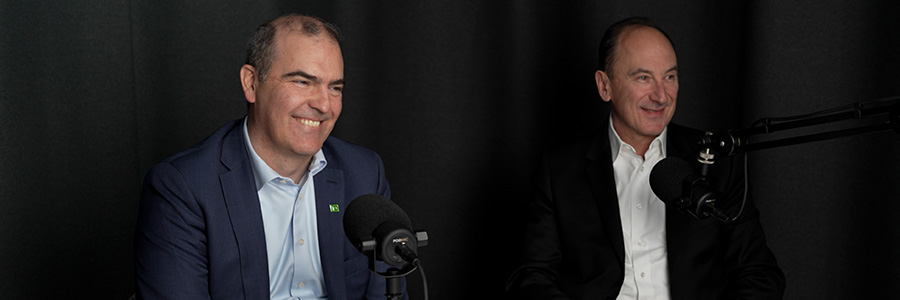Risk or Reward? Observing an AI Future for Financial Institutions
Guests: Akhil Lamba, Executive Managing Director and Head of Global Transaction Banking, TD Securities and Dan Bosman, Senior Vice President and Chief Information Officer, TD Securities and Treasury & Balance Sheet Management (TBSM)
Host: Amy Van Arnhem, Managing Director and Head of Canada Senior Relationship Management, TD Securities
Will AI shape the future of financial institutions? Listen as guests Akhil Lamba and Dan Bosman speak with host, Amy Van Arnhem about the evolving trends, such as predictive and generative AI, blockchain, and central bank digital currency, as we continue towards an increasingly digital landscape.
Listen to additional episodes for more perspectives from a variety of thought leaders on key themes influencing markets, industries and the global economy today.
This podcast was originally recorded on September 6, 2023.
WOMAN: Welcome to Viewpoint, a TD Securities podcast. Listen in as we draw perspectives from a variety of thought leaders on key themes influencing markets, industries, and the global economy today. We hope you enjoy this episode.
AMY VAN ARNHEM: Hello, and welcome to episode 23 of Viewpoint, a TD Securities podcast. My name is Amy Van Arnhem, and I will be your host for today's episode. I'm joined by two of my colleagues, Akhil Lamba, executive managing director and head of global transaction banking, and Dan Bosman, chief information officer and head of technology solutions.
Akhil has over 20 years of experience in global transaction banking where he plays an instrumental role by connecting clients to opportunities, networks, and innovative solutions. Dan has over 20 years of experience on the technology side, delivering advanced and proactive technology solutions that support our business to better serve our clients. Thank you both for joining me today.
DAN BOSMAN: Thanks for having us.
AKHIL LAMBA: Thank you, Amy.
AMY VAN ARNHEM: So last year, we had the pleasure of inviting both of you onto Viewpoint right before the 2022 Sibos conference. We discussed how developments in AI, the metaverse, digital currency, and Web 3.0 were moving towards an open universe of customizing and adapting to client-focused solutions.
So this year, the Sibos conference is actually going to be taking place right here in Toronto from September 18 to the 21st. This is going to be bringing together hundreds of global financial institutions under one roof, including TD.
So I'm personally very excited to have you both back ahead of this year's conference. And maybe before we start digging into some of the questions, Akhil, could you give the listeners just a quick overview of what takes place at Sibos and why it's considered a flagship event for so many financial institutions around the world?
AKHIL LAMBA: Sure. Thank you for having me. It's great to be here in Sibos. And Toronto is certainly exciting. Sibos, you know, typically has 7,000 or 8,000 people who attend from the banking industry and the industry at large. And it really is a venue for institutions to meet each other while we compete with each other, but it's also a venue for institutions to meet each other to see how we can collaborate.
It is really a meeting of the minds. How do we collaborate to produce and deliver better product suites for our clients? How do we collaborate to talk about things that are current and topical, whether it's fraud or cyber? And how do we work together in enhancing the security around the whole world of payments that takes place and is so necessary for global trade.
So Sibos is certainly one of the key events where this happens. And there are banking partners. There are technology partners. There are industry experts from across the globe. It's exciting. We're going to have it in Toronto. And I think it's going to be hugely successful. And hopefully, we'll have 7,000, 8,000 people attending. This is, I think, the second time it's happening after COVID. So looking forward to it.
AMY VAN ARNHEM: Oh, great. The streets of Toronto will be a little bit busier those days. Theme of this year's conference is collaborative finance in a fragmented world, so addressing issues such as working together to create a sustainable and inclusive financial industry, risk management in times of economic and geopolitical uncertainty, and the balance between technology and trust. Akhil, what are some of the key themes and outlooks you noticed throughout this year and that you're looking forward to in 2024?
AKHIL LAMBA: Look, I mean, there's a lot going on in the industry. We saw what happened in banking at large a few months ago with some of the regional banks in the US. So there is a significant amount of regulatory pressure on banks right now and the entire community. The FSB, which is a financial stability board, has sort of a G20 roadmap for enhanced cross-border payments. They've set a deadline for 2027 for the industry to address things like cost, speed, access, transparency all around cross-border payments.
Data aggregation and sharing is another key theme. And this sort of dovetails into things like cyber and fraud, which is a global phenomenon. And we need to work together on that. Collaborative innovation, how do we deliver to our clients? How do we innovate together as a community? And this also brings in the concept of fintech. How do we utilize fintechs? Where do we leverage fintechs? How do we partner with fintechs?
And they fill a gap. Banks can't do everything by themselves. So all these are becoming very, very important themes and will continue into 2024. We're going to talk about AI a little bit and on how AI is embedded into the transaction banking business on data analytics, monitoring, processing.
Blockchain, believe it or not, is still a thing. Leave aside crypto, but how do we create a more efficient infrastructure? Things like RLN, Avisa, Patio, et cetera, et cetera, digital currencies, not crypto again, but things like the CBDC, which is the central bank digital currency, is topical. So these are all the themes where institutions are going to have to collaborate with one another, work together, and collectively deliver a better experience for our clients and a more efficient product suite.
AMY VAN ARNHEM: That's great. We'll come back to some of those key themes that you mentioned a little bit later, but one of the hot topics I just want to spend a little bit more time on, Akhil, was ISO 20022-- I believe that's the correct way of saying it. It's a new messaging standard that financial institutions started adopting at the beginning of this year. Could you maybe speak to the significance of this and what it means for cross-border payments going forward and how ISO 20022 will take transaction management to the next level?
AKHIL LAMBA: Certainly. ISO 20022, quite a mouthful. Yeah. It's actually very meaningful. This is the first time in the world of cross-border payments that I'm aware of we actually have a common language. What ISO 20022 is going to do is two things. One is it's going to leave very little room for misinterpretation. The other critical thing that we're going to get from ISO 20022 is, in my view, one of the most important things is going to be data and data aggregation.
And that is going to be very useful for banks, and it's also going to be extremely useful from a client perspective. Talking about banks, we are going to be able to use some of this data, particularly around data aggregation with a lot of value-added services around fraud detection, risk forecasting, market predictions, et cetera.
But from a client perspective, clients are going to have a much better insight into demographic trends, liquidity management, cash flow forecasting, even simple things like accounts payable and accounts receivable reconciliation and how that impacts supply chain. This is going to break efficiency into the system, and it's also going to bring costs down eventually.
AMY VAN ARNHEM: Dan, from last year to this year, AI continues to be a key theme. For example, just two months after its launch, ChatGPT reached 100 million active users, making it the fastest growing app in history. How do you think generative AI will impact financial institutions? In what ways do you anticipate technologies like generative AI and language models will be leveraged in client solutions and client experience?
DAN BOSMAN: I don't think generative AI was really in our vernacular when we talked a year ago, but now it's certainly top of mind for a lot of folks. So not surprising. I think we are seeing AI adoption in the financial industry is increasing. I think about 75% of our large banks are now producing AI-based services. So we do see that accelerating.
And that by some studies, AI is projected to contribute $9 billion a year in value to the finance sector by 2030. So it's real. I would say like we talked about last year, on the predictive AI side, I think there's still opportunities to unlock value, but I think that is a slightly more well-trodden path for Southside institutions.
On the generative AI side, I think there's still a huge opportunity and a lot of learning that we need to go through as we figure out what it means for generative AI to be, quote unquote, "enterprise grade." So I think we are still working through a lot of interesting items around things like security and compliance and IP leakage, model copyright, management, accuracy, AI readiness as an organization.
What I am seeing, though, is parts of industry are beginning to move quicker than others. So if you look on the buy side, I think you see article after article of use case being identified there. And I think for institutions like TD, you know, obviously, we are trying to track along but taking a cautious approach as we work through.
There are probably about four key areas that I see interest in. So the first is the copilot type tools. So one that I'm the tech guy around the table here. So I'm going to say code copilot cogeneration is an interesting one. Some of our partners have got personal productivity, co-pilots as well.
AMY VAN ARNHEM: When you see co-pilot, is that-- can you explain what you mean by that--
DAN BOSMAN: Yeah, absolutely.
AMY VAN ARNHEM: --for us not in technology?
DAN BOSMAN: Absolutely. So on the coding side, I guess the way I look at it is a super smart autocomplete. So you know on your phone when you can type in and it tries to predict the next word? Well, imagine if it could predict the code that you're trying to write to solve a particular business problem, or, in the case of, say, Microsoft Office satellite, you could describe on a text prompt a presentation that you're trying to produce.
And then it will automatically produce the outline and the content to your company's standards. So that's kind of the co-pilot mentality. Think of it as someone sitting next to you, helping you to do your job, and amplifying what you're trying to do
AMY VAN ARNHEM: Maybe an associate or somebody that you would bring in.
DAN BOSMAN: That's a great way of looking at it. Absolutely. But again, I think it's an easy path for folks to get. And certainly, we spend a lot of time and calories on writing code and developing technology. And if there's a way to be more efficient, I think that's absolutely important.
The other areas that I see a lot of focus around would be things like knowledge management and more intuitive way of being able to search content within an organization. Good use case there could be around something like in a contact center and a call center where you can actually have access to the body of information in an organization but in a way that you can surface it and present it to an employee very easily.
Document summarization is another one. We deal with some very complex regulatory documents or research documents, et cetera. And if there's a way to be able to look through those and be able to summarize complicated information in an easy way and, of course, content generation. We talked about that, but I think there's many use cases.
What I'm seeing right now is, again, folks are in a experiment and learn stage certainly in our part of the industry. Again, understand what it means to be enterprise grade for these capabilities. It's a very different bar to meet than on the consumer side, but there's no doubt that the technology and AI is going to be transformative. I think the question is just when and how we unlock that and to get the most value.
AMY VAN ARNHEM: Yeah. I have to say that this is definitely a topic that comes up with clients quite frequently is just trying to get a better understanding and handle as to how TD and financial institutions like ourselves will use this in the future and/or look at it. And what are some of the areas that we're looking to develop? So definitely something we will keep our eye on, and we'll watch closely.
Another ongoing theme that has been brought up a few times is cybersecurity. So Dan, could you speak about how current cybersecurity trends are impacting the strategies of financial institutions as well as their clients and partners?
DAN BOSMAN: Yeah. It's a great question. And we continue to see emerging trends and threats that impact our own organization as well as our clients. We were just talking about AI and ML, and I think there are some fantastic opportunities there but also opportunities for that technology to be misused.
And I think it's an area that is going to attract a lot of interest over the coming years, things like deepfakes where you can take images and voice from someone and produce a pretty realistic copy of them. Those are only going to become more prevalent and probably more difficult to ascertain what's true and what isn't. Really interesting area around proof of humanness. In this digital world, how do if you're talking to a machine or if you're talking to a real human?
But before we get into the more advanced stuff that AI and ML are going to unlock, I think there's still some really common campaigns out there. Ransomware continues to be a top threat for high-value targets like banks and other large institutions, social engineering and fishing, fishing and smishing. We've all been through our training and probably understand those, but this is where [? Fra ?] actors are trying to manipulate their targets into sharing personal or confidential information. And it's a real key ongoing risk for organizations like ours.
And as I mentioned, one of the things that TD, I think, has done really well that really helps us keep track of this emerging threat landscape is we've invested in our fusion center, which has global coverage and focuses on intelligence reporting, data analytics, crisis management, and integrated monitoring. And it's an organization that I think has added tremendous value for focusing our efforts around the space.
Our teams rely really heavily on information being shared between key industry and government agencies to get the latest updates as well as provide input into our strategies. And so for us, our focus is always to keep our customers, colleagues, and stakeholders protected as much as possible from cyber attacks and really try and keep on top of these continually changing and evolving threats.
AMY VAN ARNHEM: I can see how this is a hot topic this year, certainly at this conference.
AKHIL LAMBA: It's interesting what you're talking about, Dan, with AI. And I was thinking about-- I was just reading recently how perpetrators or bad actors are using AI, especially generative AI, to commit fraud or AML. And you know transaction banking or payments generally cross-border payments is a high AML-risk business.
But it'll be interesting to see how we use AI to counter the fraud or AML trends that emerge out of bad actors using AI, because really don't know how humans can detect some of these situations without having tools like AI to help them predict and monitor.
DAN BOSMAN: I think you've hit the nail on the head, Akhil. You're absolutely right. I think we are going to deploy this technology around things like fraud AML, and I think you'll see continued investments across the industry in that space. But there is also, again, the bad actors also going to try and look for opportunities to weaponize that technology and use it again.
So always a little bit of an arms race, but certainly, the technology is incredibly powerful. And I think when deployed to support our clients and protect and keep us all safe, I think it's going to add a huge amount of value.
AMY VAN ARNHEM: Fighting fire with fire I guess, right?
DAN BOSMAN: Exactly.
AMY VAN ARNHEM: I did want to bring up one other thing, Akhil, with you. Just you mentioned it in some of the key themes, and I sort of put you on the spot last year to ask about a central bank digital currency and whether you thought that that would be something that you would see in the next decade. And any developments in the last year in that regard that you would view as significant? Any way that your thoughts have changed just around central bank digital currency but also around blockchain just more generally?
AKHIL LAMBA: It really hasn't changed. If you look at blockchain as a technology or DLT distributed ledgers and you decouple it from crypto-- because I think often there is a confusion between the two-- blockchain, if used, I think can have lots of value in lots of different aspects within our own industry and other industries, quite frankly.
I don't see the technology going away. I just see the technology being developed further, whether it's in the world of payments, but I also see it in terms of securities, in terms of title. If you look at real estate, title ownership and clarity around that. There's a lot of very useful uses for this technology that I think will be relevant as we go forward.
Crypto, I'm still not convinced of its relevance and its value. And I'm not even convinced whether G10 or G7 or even G20 governments will adopt crypto in any meaningful way. Digital currencies, central bank digital currencies, I do see that happening. I don't see actual paper currency going away either. I think there's a lot of debate around that.
There still remains a large swath of people, believe it or not, even in North America, who are unbanked. There is use and value for paper currency or physical currency, but I do see digital currency in the future from central banks.
AMY VAN ARNHEM: That's great. Well, look, I appreciate both of you once again joining me before the Sibos conference this year. Certainly interesting and exciting that it's going to be in Toronto. So thank you both very much.
[MUSIC PLAYING]
WOMAN: Thank you for listening to Viewpoint, a TD Securities podcast. If you enjoyed this episode, subscribe to this series on Apple Podcasts or on your favorite podcast platform. For more thought leadership content, visit tdsecurities.com and follow us on LinkedIn for all the latest TD Securities updates. For relevant disclaimers to this podcast, please refer to the Viewpoint episode page on our website.
This podcast should not be copied, distributed, published or reproduced, in whole or in part. The information contained in this recording was obtained from publicly available sources, has not been independently verified by TD Securities, may not be current, and TD Securities has no obligation to provide any updates or changes. All price references and market forecasts are as of the date of recording. The views and opinions expressed in this podcast are not necessarily those of TD Securities and may differ from the views and opinions of other departments or divisions of TD Securities and its affiliates. TD Securities is not providing any financial, economic, legal, accounting, or tax advice or recommendations in this podcast. The information contained in this podcast does not constitute investment advice or an offer to buy or sell securities or any other product and should not be relied upon to evaluate any potential transaction. Neither TD Securities nor any of its affiliates makes any representation or warranty, express or implied, as to the accuracy or completeness of the statements or any information contained in this podcast and any liability therefore (including in respect of direct, indirect or consequential loss or damage) is expressly disclaimed.
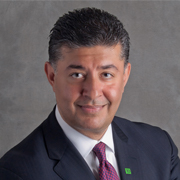
Akhil Lamba
Executive Managing Director and Head of Global Transaction Banking, TD Securities
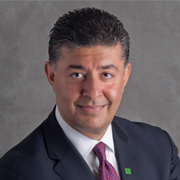
Akhil Lamba
Executive Managing Director and Head of Global Transaction Banking, TD Securities

Akhil Lamba
Executive Managing Director and Head of Global Transaction Banking, TD Securities
Akhil is the Executive Managing Director and Head of Global Transaction Banking, leading the Corporate Cash Management, Financial Institutions, Global Trade Finance, and Export & Agency Finance businesses. Akhil connects clients to opportunities, extensive networks, and innovative solutions. He supports client global transaction banking needs using TD Securities’ strong, relationship-driven approach, backed by the strength and reliability of one of the world’s safest banks.

Dan Bosman
Senior Vice President and Chief Information Officer, TD Securities and Treasury & Balance Sheet Management (TBSM)

Dan Bosman
Senior Vice President and Chief Information Officer, TD Securities and Treasury & Balance Sheet Management (TBSM)

Dan Bosman
Senior Vice President and Chief Information Officer, TD Securities and Treasury & Balance Sheet Management (TBSM)
Dan Bosman is the Senior Vice President and Chief Information Officer for TD Securities and Treasury & Balance Sheet Management (TBSM), accountable for all global technology streams and delivering innovative and proactive technology solutions that support the broker-dealer’s business objectives and growth strategies. He has been instrumental in driving project delivery change with a shift to product ownership and agile practices. Through a focus on shared infrastructure, product delivery, developer experience and partnership with colleagues across TD Securities, his team has delivered an award-winning technology platform, and in 2017 he was recognized by IDG Computerworld as a Premier 100 Technology Leader.
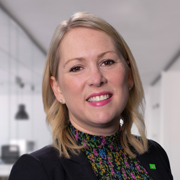
Amy Van Arnhem
Managing Director and Head of Canada Senior Relationship Management, TD Securities
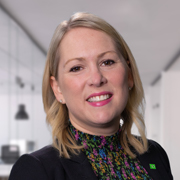
Amy Van Arnhem
Managing Director and Head of Canada Senior Relationship Management, TD Securities

Amy Van Arnhem
Managing Director and Head of Canada Senior Relationship Management, TD Securities
Amy is responsible for providing holistic cross product global coverage to senior executives for Canadian institutional clients. In her role she manages stakeholder relationships by promoting a collaborative and integrated approach across the firm. Joining our firm in 2001, Amy began her career at TD in the retail sector. In 2007, she joined the Sales and Trading rotational program at TD Securities where she gained exposure in Asset Securitization, Proprietary Equity, and Institutional Equities. In 2008, she joined the Institutional Equity Sales desk team where she covered Canadian equity clients.







